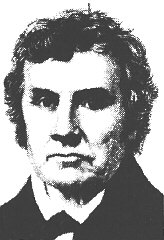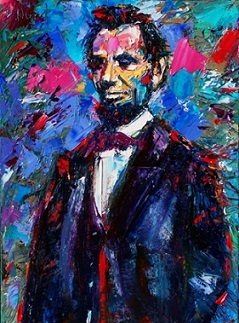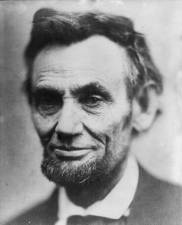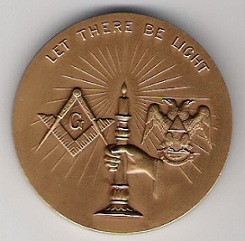Robert Shepherd adds:
 Not in any way to contradict Dr. Noll (like Harry Jaffa, Carl Sandburg, Susan B. Martinez and so many other scholars of Lincoln). My own impression of Lincoln was that he was simultaneously both leery of the dangers of "muscular" Christianity, or indeed Religion with a capital R; while at the same time deeply SPIRITUAL in an intimate and very private way. I believe that Lincoln's early and youthful rejection of religion, sometimes said to be a reaction against his father Tom Lincoln (a "Calvinist Baptist") was something he retained for a very long time. Indeed, he commented to his law partner Herndon, "You know Billy, I never tire of reading Tom Paine." As Lincoln's presidency deepened, and his personal angst no doubt increased, I believe Lincoln more and more sought solace in some kind of spirituality or assurance. He was reaching out for help, as it were, from any source yet available. And as heartfelt freedmen came to salute him (themselves rather religiously) Lincoln responded in kind, pointing them to their Jesus ("Stand up; don't pray to me"), commending their prayers and faith and brave labors, which he said contributed to the Nation's salvation.
Not in any way to contradict Dr. Noll (like Harry Jaffa, Carl Sandburg, Susan B. Martinez and so many other scholars of Lincoln). My own impression of Lincoln was that he was simultaneously both leery of the dangers of "muscular" Christianity, or indeed Religion with a capital R; while at the same time deeply SPIRITUAL in an intimate and very private way. I believe that Lincoln's early and youthful rejection of religion, sometimes said to be a reaction against his father Tom Lincoln (a "Calvinist Baptist") was something he retained for a very long time. Indeed, he commented to his law partner Herndon, "You know Billy, I never tire of reading Tom Paine." As Lincoln's presidency deepened, and his personal angst no doubt increased, I believe Lincoln more and more sought solace in some kind of spirituality or assurance. He was reaching out for help, as it were, from any source yet available. And as heartfelt freedmen came to salute him (themselves rather religiously) Lincoln responded in kind, pointing them to their Jesus ("Stand up; don't pray to me"), commending their prayers and faith and brave labors, which he said contributed to the Nation's salvation.
[10:44 AM June 05, 2010]
Lincoln and his Quakerism
Lincoln's deistic temperament might give off Quaker vibes, just as his early cautiousness (beginning of the War) caused critics to label him Quakerish. Additionally, since three of his cabinet wore "Quaker beards" (no hair on upper lip), some suggested surely he had a Quaker cabinet. But what has become more apparent to history is that Lincoln's parental roots were deeply "Friendly" too.
Jan Morris notes that Lincoln's Evanses, on his mother's Hanks' side (of Bryn Gwyn) had gravitated to Quakerism when they came to America (if not before), and Lincoln used to talk about his Quaker roots: he sometimes addressed correspondents as "Friend" --Friend Johnson, or Friend Mary -- in the old Quaker manner. (p 43) Perhaps these vestiges of childhood reflected the influence of his mother Nancy and her mother (Sarah Evans Hanks), whom he remembered from Kentucky. Those who knew the Lincolns in Kentucky commented that Nancy Hanks Lincoln was "superior" to her husband, a strong personality that taught young Abraham his letters as well as the extraordinary sweetness and forbearance he was known for all his life. She seems also to have reverted to "thees" and "thous" -- something her precocious son picked up.
He also had a tendency, discovered as scholars pored over his correspondence, to address recipients of his letters in the quaint manner of "Friend Mary" (Owens), "Friend Butler," "Friend Morris," "Friend Hardin," "Friend Durley." This was a Quaker thing, of course.
See Lincoln's Welsh ancestry. Also see "The Quakerism of Abraham Lincoln" by George B. Johnson JSTOR link.
Lincoln and the Buffalo Soldiers Marauders - From early on, Lincoln had pushed for using black soldiers in combat. There were several reasons for this. One, the blacks themselves were eager to prove themselves. Two, the draft system was much hated because of its economic bias for the affluent. Three, losses in the field were staggering. What soon became evident was that other needs were also pressing -- the restive Indians in the West. Thus, thanks to Lincoln's persistence there came into being the Buffalo Soldiers - the 62nd and 65th Regiments of Colored Infantry (what began as the 1st Missouri Regiment of Colored Infantry). A tragedy that occurred is that Lincoln's favoritism for the blacks should be juxtaposed against the Native Americans caught in the cross-hairs of history. See Minnesota Slaughter of Innocents. The Largest Mass Execution in U.S. History (well, if not totally innocent, still close to an atrocity)



 Not in any way to contradict Dr. Noll (like Harry Jaffa, Carl Sandburg, Susan B. Martinez and so many other scholars of Lincoln). My own impression of Lincoln was that he was simultaneously both leery of the dangers of "muscular" Christianity, or indeed Religion with a capital R; while at the same time deeply SPIRITUAL in an intimate and very private way. I believe that Lincoln's early and youthful rejection of religion, sometimes said to be a reaction against his father Tom Lincoln (a "Calvinist Baptist") was something he retained for a very long time. Indeed, he commented to his law partner Herndon, "You know Billy, I never tire of reading Tom Paine." As Lincoln's presidency deepened, and his personal angst no doubt increased, I believe Lincoln more and more sought solace in some kind of spirituality or assurance. He was reaching out for help, as it were, from any source yet available. And as heartfelt freedmen came to salute him (themselves rather religiously) Lincoln responded in kind, pointing them to their Jesus ("Stand up; don't pray to me"), commending their prayers and faith and brave labors, which he said contributed to the Nation's salvation.
Not in any way to contradict Dr. Noll (like Harry Jaffa, Carl Sandburg, Susan B. Martinez and so many other scholars of Lincoln). My own impression of Lincoln was that he was simultaneously both leery of the dangers of "muscular" Christianity, or indeed Religion with a capital R; while at the same time deeply SPIRITUAL in an intimate and very private way. I believe that Lincoln's early and youthful rejection of religion, sometimes said to be a reaction against his father Tom Lincoln (a "Calvinist Baptist") was something he retained for a very long time. Indeed, he commented to his law partner Herndon, "You know Billy, I never tire of reading Tom Paine." As Lincoln's presidency deepened, and his personal angst no doubt increased, I believe Lincoln more and more sought solace in some kind of spirituality or assurance. He was reaching out for help, as it were, from any source yet available. And as heartfelt freedmen came to salute him (themselves rather religiously) Lincoln responded in kind, pointing them to their Jesus ("Stand up; don't pray to me"), commending their prayers and faith and brave labors, which he said contributed to the Nation's salvation.

